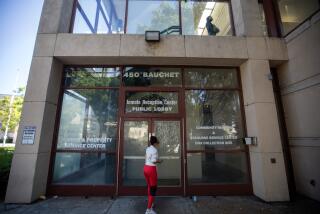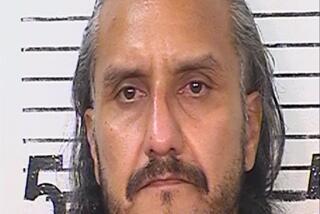California prison officials say two inmates suspected in Pinell stabbing death
Reporting from Sacramento — California prison officials on Thursday said two inmates are suspected of stabbing to death Hugo Pinell, a prominent figure in 1970s prison violence who until last year had spent more time in solitary confinement -- 43 years -- than any other state inmate.
Pinell, 71, was among those released from isolation early last year after a statewide prison hunger strike protesting California’s practice of holding inmates in isolation indefinitely for association with prison gangs.
According to the state corrections department, he was attacked shortly before 1 p.m. on Wednesday at California State Prison-Sacramento, triggering a riot on the prison yard that involved some 70 inmates.
Twenty-nine prisoners were injured in the melee, and 11 of those were taken to hospitals for treatment of stab wounds, broken bones and head trauma. Five remained hospitalized, including one inmate, 29, in critical condition from a severe head injury and multiple stab wounds, the state said.
The violent fighting continued for more than 20 minutes before officers, using pepper spray and firing warning shots, were able to regain control of the prison yard, corrections spokeswoman Terry Thornton said. No officers were injured, the department said.
The maximum-security prison is adjacent to historic Folsom State Prison about half an hour northeast of Sacramento.
A second riot also involving about 70 inmates took place two hours later at another prison in Monterey County, Thornton said. She said seven prisoners were injured in the short-lived incident, and that prison officials believe it was not related to the riot in which Pinell was killed.
“Inmates fighting is just not unusual,” Thornton said.
Pinell had a total of six life sentences, including a 1965 rape conviction that first put him in prison, and the 1971 killing of a guard at a prison in Soledad.
In August 1971, Pinell helped militant George Jackson stage an attempted escape from San Quentin State Prison, during which three officers and two inmates were killed. Jackson was shot and killed by officers. The six inmates who faced charges related to the deadly incident became known as the “San Quentin Six.”
The San Quentin incident was part of national prison movement, followed a month later by an inmate riot and hostage siege at New York’s Attica State Prison. It continues to be marked every year by inmate activist groups as Black August.
The current generation of prisoner rights activists regarded Pinell as among those who “organized against all odds, from the inside,” said Jess Heaney at Critical Resistance, an Oakland-based organization that opposes the “prison industrial complex.”
His death at the hands of other inmates “is yet another marker the prison regime is not able to handle building for unity,” Heaney said, “pitting racial groups against each other.”
Corrections officials referred to Pinell as a murderer and rapist, and the organization that Jackson founded, the Black Guerrilla Family, as a violent gang.
“They were never anything but a gang involved in violence both in and outside the correctional system,” said Jim Vuchsas, a retired Los Angeles Police Department gang unit chief and member of the statewide prison gang task force. “To say they were fighting for civil rights is like comparing a Hamas to a group of religious scholars.”
ALSO:
California senator proposes immigration holds on felons in country illegally
Six arrested in latest of several DMV bribery cases
Gov. Brown signs law barring grand juries in police deadly force cases
More to Read
Sign up for Essential California
The most important California stories and recommendations in your inbox every morning.
You may occasionally receive promotional content from the Los Angeles Times.











